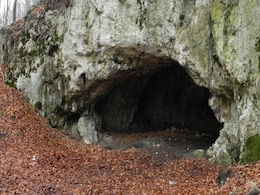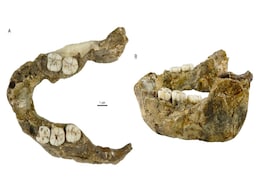Human Evolution
- All
- News
- Videos
- Web Stories
-

Besides Humans, This Primate Has Developed Language Skills, Say Scientists
- Friday April 4, 2025
- World News | The Conversation
Humans can effortlessly talk about an infinite number of topics, from neuroscience to pink elephants, by combining words into sentences.
-
 www.ndtv.com
www.ndtv.com
-

Ancient Europeans Retained Dark Skin, Hair and Eyes Until the Iron Age, Claims New Study
- Monday March 17, 2025
- Written by Gadgets 360 Staff
A genetic study analysing 348 ancient DNA samples reveals that most prehistoric Europeans had dark skin, hair, and eyes well into the Iron Age. Although genes for lighter pigmentation appeared around 14,000 years ago, they remained rare until about 3,000 years ago. Lighter skin may have been advantageous for vitamin D production, while lighter eyes...
-
 www.gadgets360.com
www.gadgets360.com
-

Neanderthal Genetic Bottleneck 110,000 Years Ago May Explain Their Decline
- Wednesday March 5, 2025
- Written by Gadgets 360 Staff
A study suggests that Neanderthals experienced a population bottleneck 110,000 years ago, drastically reducing their genetic diversity. CT scans of their inner ear bones revealed a sharp decline in variation, indicating a drop in population size. This event may have made Neanderthals more vulnerable to environmental and competitive pressures, contr...
-
 www.gadgets360.com
www.gadgets360.com
-

Human-Like Lifeforms Beyond Earth? New Study Says It's More Likely Than We Thought
- Sunday February 16, 2025
- Science | Edited by Ritu Singh
The research proposes that the emergence of humanity on Earth was not as improbable as previously thought, potentially increasing the likelihood of intelligent life existing on other planets.
-
 www.ndtv.com
www.ndtv.com
-

Study Uncovers Evidence of Cannibalism in Ancient Europe 18,000 Years Ago
- Tuesday February 11, 2025
- Written by Gadgets 360 Staff
A study on 18,000-year-old human remains found in Maszycka Cave, Poland, has revealed strong evidence of cannibalism. Researchers discovered cut marks and skull fractures that indicate scalping, defleshing, and brain extraction. The findings suggest the practice was tied to warfare rather than survival, with human remains found alongside butchered ...
-
 www.gadgets360.com
www.gadgets360.com
-

Why The Tibetan Plateau Holds The Key To A New Era Of Human Evolution
- Saturday February 8, 2025
- Science | Edited by Nikhil Pandey
A new study reveals that Tibetan communities have developed unique adaptations to survive in the low-oxygen conditions of the Tibetan Plateau.
-
 www.ndtv.com
www.ndtv.com
-

1.4 Million-Year-Old Jaw Identified as New Paranthropus Species in South Africa
- Friday February 7, 2025
- Written by Gadgets 360 Staff
A fossil jawbone discovered in South Africa, initially misclassified, has been identified as a new species, Paranthropus capensis. Using advanced 3D imaging, researchers found that the jaw’s structure and molars differed significantly from known Homo and Paranthropus species. The findings suggest that at least two Paranthropus species coexisted a...
-
 www.gadgets360.com
www.gadgets360.com
-

Ear Muscles Flex to Help Focus on Sounds, Study Reveals Evolutionary Link
- Tuesday February 4, 2025
- Written by Gadgets 360 Staff
A study reveals that tiny ear muscles flex when people focus on specific sounds in noisy environments. Once vital for movement in ancestral species, these muscles no longer serve a major function in modern humans but may hold potential for hearing aid advancements. Researchers observed that superior auricular muscles react to difficult listening ta...
-
 www.gadgets360.com
www.gadgets360.com
-

Human Outer Ears May Have Evolved from Ancient Fish Gills, Study Finds
- Monday January 27, 2025
- Written by Gadgets 360 Staff
Human outer ears may have evolved from the cartilage in ancient fish gills, according to recent research. Gene-editing experiments demonstrated a genetic link between fish gills and mammalian ears, with findings suggesting this transformation dates back millions of years. Researchers tested genetic enhancers in zebrafish, mice, and lizards, uncover...
-
 www.gadgets360.com
www.gadgets360.com
-

1.95-Million-Year-Old Evidence of Hominin Activity Discovered in Romania
- Friday January 24, 2025
- Written by Gadgets 360 Staff
A discovery in Romania’s Grăunceanu site has unearthed evidence of hominin activity dating back approximately 1.95 million years, much earlier than previously believed. The find, including butchered animal remains with cut marks, reveals that early humans were adapting to temperate environments long before expected. This reshapes our understandi...
-
 www.gadgets360.com
www.gadgets360.com
-

Early Human Ancestors Had Plant-Based Diets, Research Suggests
- Tuesday January 21, 2025
- Written by Gadgets 360 Staff
New research reveals that Australopithecus africanus, an early human ancestor, primarily ate plants. Fossilised tooth analysis suggests meat was not a major part of their diet. This study, published in Science, challenges the idea that early hominins relied on animal protein for cognitive development. Researchers point out the possibility of insect...
-
 www.gadgets360.com
www.gadgets360.com
-

Ancient Ice Core from Antarctica May Reveal Climate Mysteries from 1.2 Million Years Ago
- Tuesday January 14, 2025
- Written by Gadgets 360 Staff
A team of scientists in Antarctica has extracted a 2.8-kilometre-long ice core from Little Dome C, believed to be 1.2 million years old. The ice core contains trapped air bubbles and volcanic ash, offering valuable data on climate shifts and the Mid-Pleistocene Transition. The research aims to uncover the cause behind significant climatic changes a...
-
 www.gadgets360.com
www.gadgets360.com
-

New Cartilage Type Found: Lipocartilage Resembles Fat, Boosts Elasticity
- Saturday January 11, 2025
- Written by Gadgets 360 Staff
Scientists have identified lipocartilage, a newly classified type of cartilage featuring fat-filled, balloon-like cells that offer elasticity and structural stability. Found in the external ears, noses, and throats of mammals, including humans, this tissue differs from traditional cartilage types by maintaining its size regardless of calorie intake...
-
 www.gadgets360.com
www.gadgets360.com
-

Research Shows Twin Births Were Common in Ancient Primate Evolution
- Monday January 6, 2025
- Written by Gadgets 360 Staff
Research suggests that ancient primates, including early humans, typically gave birth to twins, a common trait in their evolutionary history. Over time, singletons became more prevalent due to the survival advantages of larger, more developed offspring. This shift is linked to the evolution of primates' larger brains and bodies, requiring more ener...
-
 www.gadgets360.com
www.gadgets360.com
-

Chimpanzees Use Stone Tools like Ancient Human, Study Finds
- Monday January 6, 2025
- Written by Gadgets 360 Staff
Recent research reveals that chimpanzees select stone tools for cracking nuts in ways that may reflect techniques used by ancient human ancestors. The study observed how chimpanzees chose rocks for hammers and anvils based on their mechanical properties, such as hardness, shape, and elasticity, rather than their appearance. This mirrors the tool se...
-
 www.gadgets360.com
www.gadgets360.com
-

Besides Humans, This Primate Has Developed Language Skills, Say Scientists
- Friday April 4, 2025
- World News | The Conversation
Humans can effortlessly talk about an infinite number of topics, from neuroscience to pink elephants, by combining words into sentences.
-
 www.ndtv.com
www.ndtv.com
-

Ancient Europeans Retained Dark Skin, Hair and Eyes Until the Iron Age, Claims New Study
- Monday March 17, 2025
- Written by Gadgets 360 Staff
A genetic study analysing 348 ancient DNA samples reveals that most prehistoric Europeans had dark skin, hair, and eyes well into the Iron Age. Although genes for lighter pigmentation appeared around 14,000 years ago, they remained rare until about 3,000 years ago. Lighter skin may have been advantageous for vitamin D production, while lighter eyes...
-
 www.gadgets360.com
www.gadgets360.com
-

Neanderthal Genetic Bottleneck 110,000 Years Ago May Explain Their Decline
- Wednesday March 5, 2025
- Written by Gadgets 360 Staff
A study suggests that Neanderthals experienced a population bottleneck 110,000 years ago, drastically reducing their genetic diversity. CT scans of their inner ear bones revealed a sharp decline in variation, indicating a drop in population size. This event may have made Neanderthals more vulnerable to environmental and competitive pressures, contr...
-
 www.gadgets360.com
www.gadgets360.com
-

Human-Like Lifeforms Beyond Earth? New Study Says It's More Likely Than We Thought
- Sunday February 16, 2025
- Science | Edited by Ritu Singh
The research proposes that the emergence of humanity on Earth was not as improbable as previously thought, potentially increasing the likelihood of intelligent life existing on other planets.
-
 www.ndtv.com
www.ndtv.com
-

Study Uncovers Evidence of Cannibalism in Ancient Europe 18,000 Years Ago
- Tuesday February 11, 2025
- Written by Gadgets 360 Staff
A study on 18,000-year-old human remains found in Maszycka Cave, Poland, has revealed strong evidence of cannibalism. Researchers discovered cut marks and skull fractures that indicate scalping, defleshing, and brain extraction. The findings suggest the practice was tied to warfare rather than survival, with human remains found alongside butchered ...
-
 www.gadgets360.com
www.gadgets360.com
-

Why The Tibetan Plateau Holds The Key To A New Era Of Human Evolution
- Saturday February 8, 2025
- Science | Edited by Nikhil Pandey
A new study reveals that Tibetan communities have developed unique adaptations to survive in the low-oxygen conditions of the Tibetan Plateau.
-
 www.ndtv.com
www.ndtv.com
-

1.4 Million-Year-Old Jaw Identified as New Paranthropus Species in South Africa
- Friday February 7, 2025
- Written by Gadgets 360 Staff
A fossil jawbone discovered in South Africa, initially misclassified, has been identified as a new species, Paranthropus capensis. Using advanced 3D imaging, researchers found that the jaw’s structure and molars differed significantly from known Homo and Paranthropus species. The findings suggest that at least two Paranthropus species coexisted a...
-
 www.gadgets360.com
www.gadgets360.com
-

Ear Muscles Flex to Help Focus on Sounds, Study Reveals Evolutionary Link
- Tuesday February 4, 2025
- Written by Gadgets 360 Staff
A study reveals that tiny ear muscles flex when people focus on specific sounds in noisy environments. Once vital for movement in ancestral species, these muscles no longer serve a major function in modern humans but may hold potential for hearing aid advancements. Researchers observed that superior auricular muscles react to difficult listening ta...
-
 www.gadgets360.com
www.gadgets360.com
-

Human Outer Ears May Have Evolved from Ancient Fish Gills, Study Finds
- Monday January 27, 2025
- Written by Gadgets 360 Staff
Human outer ears may have evolved from the cartilage in ancient fish gills, according to recent research. Gene-editing experiments demonstrated a genetic link between fish gills and mammalian ears, with findings suggesting this transformation dates back millions of years. Researchers tested genetic enhancers in zebrafish, mice, and lizards, uncover...
-
 www.gadgets360.com
www.gadgets360.com
-

1.95-Million-Year-Old Evidence of Hominin Activity Discovered in Romania
- Friday January 24, 2025
- Written by Gadgets 360 Staff
A discovery in Romania’s Grăunceanu site has unearthed evidence of hominin activity dating back approximately 1.95 million years, much earlier than previously believed. The find, including butchered animal remains with cut marks, reveals that early humans were adapting to temperate environments long before expected. This reshapes our understandi...
-
 www.gadgets360.com
www.gadgets360.com
-

Early Human Ancestors Had Plant-Based Diets, Research Suggests
- Tuesday January 21, 2025
- Written by Gadgets 360 Staff
New research reveals that Australopithecus africanus, an early human ancestor, primarily ate plants. Fossilised tooth analysis suggests meat was not a major part of their diet. This study, published in Science, challenges the idea that early hominins relied on animal protein for cognitive development. Researchers point out the possibility of insect...
-
 www.gadgets360.com
www.gadgets360.com
-

Ancient Ice Core from Antarctica May Reveal Climate Mysteries from 1.2 Million Years Ago
- Tuesday January 14, 2025
- Written by Gadgets 360 Staff
A team of scientists in Antarctica has extracted a 2.8-kilometre-long ice core from Little Dome C, believed to be 1.2 million years old. The ice core contains trapped air bubbles and volcanic ash, offering valuable data on climate shifts and the Mid-Pleistocene Transition. The research aims to uncover the cause behind significant climatic changes a...
-
 www.gadgets360.com
www.gadgets360.com
-

New Cartilage Type Found: Lipocartilage Resembles Fat, Boosts Elasticity
- Saturday January 11, 2025
- Written by Gadgets 360 Staff
Scientists have identified lipocartilage, a newly classified type of cartilage featuring fat-filled, balloon-like cells that offer elasticity and structural stability. Found in the external ears, noses, and throats of mammals, including humans, this tissue differs from traditional cartilage types by maintaining its size regardless of calorie intake...
-
 www.gadgets360.com
www.gadgets360.com
-

Research Shows Twin Births Were Common in Ancient Primate Evolution
- Monday January 6, 2025
- Written by Gadgets 360 Staff
Research suggests that ancient primates, including early humans, typically gave birth to twins, a common trait in their evolutionary history. Over time, singletons became more prevalent due to the survival advantages of larger, more developed offspring. This shift is linked to the evolution of primates' larger brains and bodies, requiring more ener...
-
 www.gadgets360.com
www.gadgets360.com
-

Chimpanzees Use Stone Tools like Ancient Human, Study Finds
- Monday January 6, 2025
- Written by Gadgets 360 Staff
Recent research reveals that chimpanzees select stone tools for cracking nuts in ways that may reflect techniques used by ancient human ancestors. The study observed how chimpanzees chose rocks for hammers and anvils based on their mechanical properties, such as hardness, shape, and elasticity, rather than their appearance. This mirrors the tool se...
-
 www.gadgets360.com
www.gadgets360.com
























